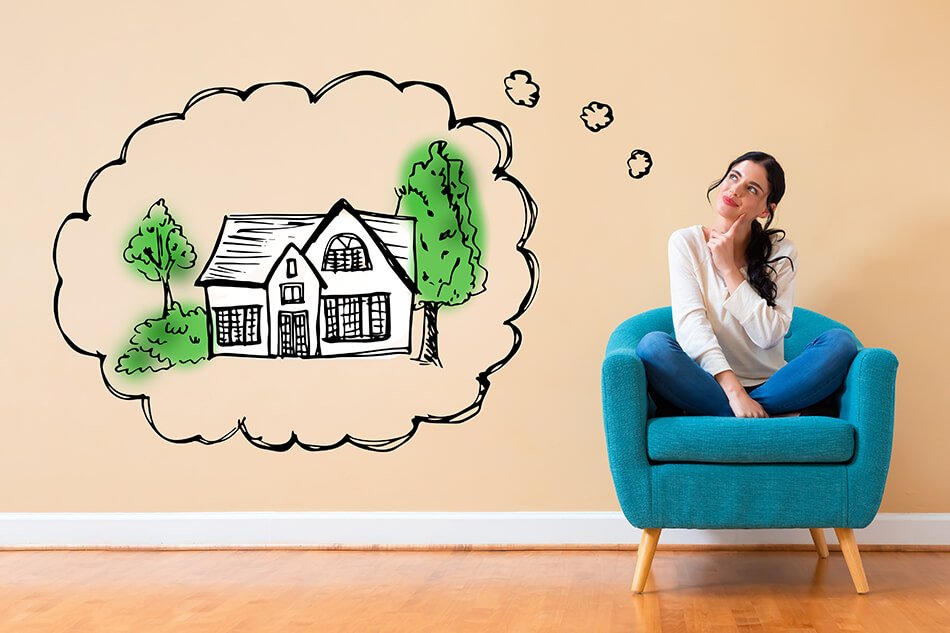- Buying vs Building a house?
- Building your own home
- What is a Construction Loan?
- How do construction loans work?
- How long does it take to build a house?
- Is it difficult to apply for a construction loan?
- Five-Stage Plan
- Home Builder Grant
- Pros and Cons of a Construction Loan
- Pros
- Cons
- Construction Loan Completion
- How can I apply for a construction home loan?
- Contact Lendstreet for personal advice
- Buying an established home
- What is a Home Loan?
- How do Home Loans work?
- First Home Buyers
- Your Broker Can Help You
- Applying for a First Home Loan
- What help can you apply for?
- First Home Owner Grants
- Stamp Duty Help
- Stamp duty varies across states
- Low Deposit or No Deposit?
- Super Saver Scheme
- Guarantor Loan
- Applying for a Next Home Loan
- Home Loans for the Self-Employed
- Applying for a Low Doc Loan
- Should you buy a home or build a home?
- Secure personal advice from Lendstreet
Did you know that it is often cheaper to build a house on vacant land, rather than buy established properties?
The median property price in Sydney, including stamp duty, totals $1,134,810. Buying land and constructing a home in Sydney may only cost you $857,639. You could, therefore, save over $277,000 if you built your own home!
Of course, unexpected costs may appear, so the exact cost may differ. But, in general, it is often cheaper to build your own house, especially in capital cities.
So, what is the better choice; buying or building a house in Australia? What are the benefits of building a house vs buying?
Here, we detail the main benefits and limitations of choosing to buy an existing home or build your own house.
Buying vs Building a house?
Buying an established home is a more straightforward feat because more people apply for a regular mortgage loan.
But did you know that you can apply for finance to build your own house?
Building your own home
Building your property ensures that you can design a floor plan to meet your needs. You can achieve a show house finish and a two-car garage!
You can secure a house and land package and apply for a home construction loan to finance the project.
But what is a construction loan and how do these types of finance work?
What is a Construction Loan?
If you are considering building your own house, a construction loan is perfect for you! Why buy an existing property when you can design and build your own home exactly to meet your needs?!
A construction loan enables you to apply for finance but withdraw instalments. upon reaching a stage in the construction project.
Building a house can be complicated, and costs can sometimes be higher or lower than the initial quote.
A construction loan allows you to borrow the precise amount you need to complete the project.
How do construction loans work?
There are different types of loans for construction, so it is important to seek professional advice. Your professional mortgage broker can help you decide what type of construction loan is perfect for you.
There are variable-rate construction loans and fixed-rate construction loans available, depending on your personal status.
Every time an instalment is paid to you, you will only be charged interest on the borrowed amount.
Some construction projects can take up to one year or even longer. Paying interest on the instalments received considers the length of time construction can take. This type of loan also recognises the delays that can sometimes occur.
Once you have received the total number of instalments, the construction loan will become a regular variable home loan.
How long does it take to build a house?
A generous period of 24 months is given for the construction of the property to meet fruition. The average house requires between 4 months to 12 months to complete.
Therefore, the 24 months allowed by a construction loan allow for delays and some unforeseen circumstances.
Is it difficult to apply for a construction loan?
A wide range of documentation is required to apply for a construction loan due to the complexities of building a property.
You must agree with the lender about what each stage of the construction project will look like. Once this has been agreed upon, a progressive draw-down will be enacted to enable a list of instalments to be available.
When another stage of the project is reached, you can receive another instalment.
Five-Stage Plan
On average, construction projects in Australia follow a five-stage development plan. Lenders usually arrange instalments around those five stages.
These five stages are Slab, Frame, Lockup, Fitout, and Completion. Instalment plans can be tailored depending on which lender you choose, however.
Home Builder Grant
You may be able to apply for a home builder grant if you are also a first home buyer. This type of homeowner grant can be available to you if you earn no more than $125,000 each year as an individual.
If you are applying as a couple, then you can own no more than $200,000 per year together. You can reduce the costs of developing a newly built house by $15,000.
You can spend this amount on either part of the house and land package.
Pros and Cons of a Construction Loan
Applying for a home loan can be confusing. What is the best option for you?
Here are the advantages and disadvantages of applying for a construction home loan.
Pros
A construction loan opens up more choices for potential property buyers. You are not limited to solely purchasing an existing property. Many individuals buy an existing property and then extend the property or make other alterations.
Why not design your own home? Consisting of the size and layout you want, build your own home tailored to your lifestyle!
These loans are tailored for the construction industry. They understand that each stage of construction can come with delays or cost adjustments. A construction home loan, therefore, pays you in instalments depending on your construction plans.
The money is ready when you need it, but you are not paying interest on unused money.
Interest is only payable on the instalments that you have received. This is a great advantage as less interest is payable in the earlier stages of construction.
You can also make interest-only payments for the land prior to the commencement of construction. This enables you to get construction underway and keep initial costs low.
The construction home loan allows you 24 months to complete the project.
This period is substantially longer than the average time it takes to build a house.
If you wish, the construction loan can be divided to recognise investment debt and personal debt separately.
Your expert mortgage broker can advise you on the best course of action for you individually.
Cons
To release the instalments of the construction loan, proof of the work completed is required. Of course, this should not be a problem for most individuals.
However, if a stage has not been completed as you have run out of funds, you may face some difficulties.
Owner builders may only be able to raise a 50% loan to value ratio.
A wider range of documentation and requirements is needed for a construction home loan than a standard mortgage.
For example, before applying, your plans may have to be pre-approved by your local council.
Construction Loan Completion
Once the construction process has reached completion, the construction loan will become a variable home loan.
Like a regular home loan, you will now be required to pay the regular monthly payments. However, you now have the personally designed home of your dreams!
How can I apply for a construction home loan?
You CAN apply straight to a lender. But, how would you know if you were applying for the best type of loan for your circumstances?
Contact Lendstreet for personal advice
The best application process allows a mortgage broker to find the best loan options for you.
Visit your trusted broker and complete the online form.
You will need to enter your information into the online form, and then a professional broker will contact you ASAP!
Alternatively, you can speak directly to an expert broker by calling 1300 317 0412 or emailing support@lendstreet.com.au.
However, if you have decided that building your own home is not for you, Lendstreet can assist you with a range of home loans!
Buying an established home
Buying a house that is listed for sale is a simpler process than embarking on your own construction project.
Your appointed credit representatives can guide you through a range of home loan products from lenders such as the commonwealth bank.
But, what is a home loan, and how can you apply for one?
What is a Home Loan?
You may think that the building process to construct your dream home is too complex. After all, you first have to find vacant land in your desired location.
You then have to create a set of plans and seek the relevant approval required. You also have to begin the process to apply for a construction loan.
Many potential homebuyers find an existing house that is their dream home.
You simply have to apply for the home loan finance of the property and meet the monthly fees once the transaction is complete.
Buying an established home can be an easier and faster process for many homeowners.
Additionally, there can be more options available for your financial situation. Some individuals may be able to buy a property in cash, although most individuals will need a home loan.
How do Home Loans work?
There are different types of home loans, depending on your financial situation.
First Home Buyers
Buying your first home can be a daunting event. Which property location do you choose? Should you choose a new build or an existing home that requires modernisation? How do you apply for a home loan?
Your Broker Can Help You
Expert brokers can discover your perfect options, enabling you to easily buy your own house. Your friendly broker can listen to your needs and advise you on what course of action to take.
They can help you avoid unnecessary risks and help alleviate some of the stress that home buying can generate.
Seeking the services of a mortgage broker is free for you!
The fee which the mortgage broker receives comes from the lender who you choose to take your loan from. It costs you nothing and means that pre-approval is quick and straightforward.
This allows you to have an advantage over potential homebuyers without pre-approval when house hunting.
Applying for a First Home Loan
When applying for a first home loan, you would usually have a 20% deposit ready in your bank. Your credit score, along with any assets, savings, and income would be taken into account.
What help can you apply for?
There may be some help in the form of grants and saving schemes that first home buyers may be applicable for. You could also consider loans with a low or zero deposit or a guarantor loan.
First Home Owner Grants
You may be able to apply for a First Home Owner Grant, which contributes at least $10,000 toward your new home. This can be used to reduce the total amount of deposit you need.
Today, the median property price in Australia is a staggering $738,975, resulting in a required 20% deposit of $147,795. The First Home Owners’ Grant can help you reach this deposit amount quicker.
Stamp Duty Help
An additional incentive that first home buyers may be eligible for is the stamp duty waiver or concession. Stamp duty incentives vary across Australia, with NSW offering the most generous benefit. If you are a first home purchaser in NSW, you may be able to enjoy paying zero stamp duty fees!
The amount of stamp duty paid depends on the property value and the state or territory you live in. For example, if purchasing a house for the median property price of £738,975 in Queensland, stamp duty costs £21,592. First home purchasers may receive a $15,000 reduction off this stamp duty amount.
Visit Lendstreet’s stamp duty calculator to find the exact amount for you.
Stamp duty varies across states
Government grants vary from state to state, so visit Lendstreet to discover which grants apply to you. You must be over the age of 18, and you should be an Australian citizen or be a permanent resident of the country.
You are only eligible for such grants once, and you cannot have owned a property previously.
Low Deposit or No Deposit?
Buying an existing home can be an expensive venture. As property prices surge at an astounding rate, saving for the recommended 20% deposit can become unreachable for some individuals.
Your mortgage broker professional may have the perfect remedy for you in the form of low deposit or no deposit home loans.
Whilst paying a deposit of 20% is recommended when buying an established property, it is not compulsory. You could be lucky enough to find a credit provider who would accept as little as a 3% deposit!
Your mortgage broker will be able to tell you if this is achievable for your circumstances.
The reason why it is recommended to pay a 20% deposit is to eliminate the requirement to pay lenders’ mortgage insurance. This insurance amounts to ongoing fees.
The need to pay lenders’ mortgage insurance is at the lender’s request, although it leads to another monthly payment for you.
With rising energy bills, being lumbered with another cost is not a great option. Although you may think it is worth paying the lenders’ mortgage insurance if you can purchase an established house faster.
Super Saver Scheme
First home purchasers may also be eligible for the First Home Super Saver Scheme.
This scheme helps first home purchasers save for their deposit, although you may have fees to pay if you withdraw your savings too early.
Guarantor Loan
You could talk to your broker about a guarantor loan! A guarantor loan requires a family member, or a friend, to guarantee that you will always make the loan repayments.
If you do not pay, then they will be liable. This could be a great option to help you get on the property ladder quickly. However, someone with excellent credit will need to support you.
Applying for a Next Home Loan
Lendstreet can help you discover the options available to you if you are buying your next property. If you want to buy another established home, you may be more confused than when you were a first home buyer!
What normal home loans are available? What are the lending criteria? How much can I borrow? Your mortgage broker experts will guide you from step to step to buy your established home.
Every situation will be dealt with uniquely, tailoring solutions to meet your own needs. Maybe you want to talk with your broker about low deposit or no deposit home loans?
Whatever your circumstances, Lendstreet can help you!
Home Loans for the Self-Employed
Buying an established property can be the right choice for self-employed individuals.
The self-employed may find it more challenging to receive home construction loans, but they could purchase an existing home. A great option is the low doc home loan, offering home loans with relaxed lending criteria.
Applying for a Low Doc Loan
What evidence do you need to provide for a low doc loan? You may be able to show your ABN, BAS, and bank statements as your main evidence of income.
You will also have to sign an income declaration to confirm that you can meet repayments.
Should you buy a home or build a home?
Building a house yourself can be the best option. However, you must first find the perfect patch of land and then successfully apply for a construction home loan.
Unless you are paying cash, of course! Although, you can design your floor plan and choose a display home finish.
It is wise to expect the unexpected when building a house, however. There may be unexpected costs, and your cash flow may suffer from time to time.
You must hope that the council approvals go smoothly and that legal fees do not rise. However, land costs can be extremely costly, particularly in a capital city.
Finding a credit provider to finance a regular mortgage for established homes is much easier. Although, you may achieve lower financing costs when seeking credit services.
An established property means a simpler transaction with more relevant credit provider options available.
You will have to pay stamp duty, which varies from state to state. Visit Lendstreet’s stamp duty calculator; Australian states are searchable to determine higher government fees.
You may not have to pay stamp duty if you are buying your first established home.
However, building your own house is potentially money-saving depending on the location you choose. Whilst purchasing an existing home
Get the latest news and updates from Lendstreet
Join and subscribe to our newsletter.
Secure personal advice from Lendstreet
Contact your broker experts today! Possessing an Australian Credit Licence, we can help you buy an existing home or finance a construction.
Simply contact us by phoning 1300 317 0412, or complete the online form on our website!
We will ask you a range of simple questions and will present you with a series of possible options. We will be with you every step of the way, so get in touch today!
Schedule a call to one of our expert mortgage broker
Ask our expert mortgage brokers anything about home loans.
Related articles
If you're living in Australia and currently deciding whether to take out a home loan, it's essential to understand ...
Key Takeaways: Lenders inform credit bureaus of your lending and repayments activities. Different credit reporting bureaus use different scale boundaries. ...
Did you know that over 67% of Australians own their own home? That is over 5.4 million homeowners across the ...









